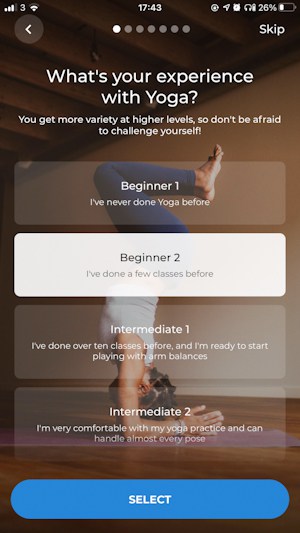
Yoga can be a great way for you to lower back pain and improve your functioning. It can ease back pain, reduce muscle soreness and increase mood. Yoga has many benefits. You will find some of these benefits in the following article. Below are some of the more popular ones.
Exercise
Bridge Pose, one of the most effective exercises to reduce back pain, is one of my favorite. This yoga position stretches the lower back and abdomen as well as the chest. It is also known to be Setu Bandhasana. If you've been sitting for a long time, your lower back can become compressed. This position helps to stretch your muscles and improve your posture. You can do this exercise by lying on your stomach, knees bent, and lying on your back. Next, place each foot hip-width apart.
It is important to do core exercises in order to prevent back pain. A strong back will protect your spine and endure more stress. Make sure to do the right exercises to strengthen your back and prevent pulling or straining your muscles. Core strengthening exercises target your back, hips, and buttocks. You can start small and increase your reps as you progress. You will feel stronger if you do them multiple times per day.
NSAIDs

Although NSAIDs may be effective in treating back pain, there are some potential risks. It is best to use NSAIDs sparingly and to be patient with back pain flare-ups. Use only the recommended dose and limit your dosage. But there is no single medicine that can be effective for everyone, and you should be sure to discuss any possible risks with your doctor.
Among the many risks associated with NSAIDs for back pain, one is gastrointestinal side effects. Although studies have shown that NSAIDs can increase the risk of gastrointestinal problems, there are no conclusive findings. NSAIDs are not recommended for back pain. However, they are often prescribed by doctors around the globe and are a common cause of disability. According to a recent review in Annals of the Rheumatic Diseases, they are not recommended as a first-line treatment.
Stretching muscles
There are many causes of back pain. If your symptoms persist, or become more severe, you should seek medical attention. Flexibility and back pain can be reduced by daily stretching. It is important not to do any strenuous exercises or cause more harm. You may need to see a chiropractor for pain relief. Gentle stretching can help you keep your back healthy.
Begin by lying flat on your stomach. Next, you should lie on your stomach and squeeze your shoulder blades together. Hold this position for 20 second. You can repeat this five times. You should wear comfortable clothes and not feel any pain while performing this stretch. These stretches should not be performed with your back. For 20 to 30 seconds, hold each position and then go back to the beginning. Repeat this five to ten additional times. You may also find it helpful to listen to soothing music while doing these stretches.
Boost your mood

Yoga can improve your mood. You will feel more positive and less anxious when you increase your serotonin. Yoga poses that increase serotonin levels also reduce feelings of anger, fatigue, and stress. You can get the most out of yoga by paying attention to your breath. You can keep your mind focused on your breath and you will find happiness.
Yoga benefits go far beyond relieving back pain. Yoga can improve your physical and mental health as well as your ability to perform better in the gym. Yoga strengthens bones and muscles, and promotes a healthy lifestyle. Recent research examined the effects yoga had on chronic low back pain in 320 adults of low income and racially diverse races. The results were published in the Annals of Internal Medicine. It has been proven that yoga can reduce anxiety and improve mood in those suffering from chronic low-back pain.
FAQ
Why is mental wellbeing important?
Everyone needs mental health. You can't do anything else if you aren't mentally well. It is important to have a healthy mind.
Our bodies can start to feel stressed if we don't feel well. This could cause problems in the body such as backaches, stomachaches, headaches and stomach pains. For our minds and bodies to be healthy, we need to take care of ourselves.
What is Positive Psychology? Why is it Important?
Positive psychology emphasizes what makes us feel good about ourselves. This includes happiness, optimism, gratitude and hope. Positive psychology seeks to make individuals happier, healthier and more intelligent through self-improvement.
There are two types of positive psychology: trait positive psychology and process positive psychology. Trait positive psychology studies the natural behavior of people. The process of positive psychology studies how to use specific strategies to achieve certain goals.
Are there any problems with me if my depression is persistent?
Depression is a problem that teens often face. But, many teens struggle with depression.
This does not mean you are weak or crazy. Most people who feel depressed don’t realize it. Depression can be a medical condition.
There are different kinds of depression. There are different types of depression. Some people experience only sadness, while others feel other emotions. There are different levels of severity.
Some people experience mild depression, while others have severe cases. Depression is not always bad. Sometimes, depression can be helpful in coping with stressful situations.
If you are constantly feeling sad, tired, or demotivated, it's a good idea for you to visit a doctor. Your doctor will diagnose you and recommend treatment.
How can one tell if someone has a mental disorder?
Persons may be diagnosed with mental illness if they have symptoms that are disruptive to their daily life. Symptoms of mental illnesses vary from person to person. The most common symptoms are feeling depressed, sad, anxious, guilty and hopeless, lonely or depressed, as well as guilt, shame, guilt, guilty, guilty, guilty, suicidal and worthless.
A person may also be diagnosed with a mental disorder if they meet at least three out of four criteria listed below:
-
Are you having trouble with your thoughts or emotions?
-
Be disturbed
-
Disturbance to functioning
-
A decrease in ability to relate with others
What are some examples for mental-emotional disorders?
Any condition that causes severe distress or impairment in functioning is considered a mental disorder. Some examples of mental disorder include anxiety, depression, schizophrenia.
Statistics
- It does have some influence, but not nearly as much as we might think, so focusing less on attaining wealth will likely make you happier (Aknin, Norton, & Dunn, 2009); (positivepsychology.com)
- Neuropsychiatric diseases are the leading cause of death and disability in the U.S., accounting for 18.7 percent of all years of potential lifespan loss and premature mortality.
- More than 40 million adults in the United States have an anxiety disorder, but less than 37% of people seek mental health treatment for their symptoms. (talkspace.com)
- Similarly, while there is some agreement about the boundaries of typical mental disorders 2, there is likely less agreement about those for positive mental health. (ncbi.nlm.nih.gov)
- In any given year, an estimated 18.1% (43.6 million) of U.S. adults ages 18 years or older suffered from any mental illness, and 4.2% (9.8 million) (healthypeople.gov)
External Links
How To
How to improve memory
Everyone wants to be better at remembering things. Memory loss happens to everyone at some time. More than half of Americans over 65 are affected by some type of dementia.
No matter if you are dealing with Alzheimer's disease, dementia or any other form of cognitive decline, there are many options to improve your memory. Here are three easy steps that you can start today:
-
Get more fruits and vegetables. Vegetables contain phytochemicals, vitamins, nutrients, fiber, antioxidants, and minerals that enhance brain function. They also provide essential nutrients that protect against neurological diseases.
-
Get enough sleep. Poor concentration and memory loss have been linked to sleep deprivation. Get seven to eight hours of sleep each night.
-
Go for a walk. Walking stimulates blood flow, which increases memory. Walking can help you lose weight, which will make you appear slimmer and healthier.